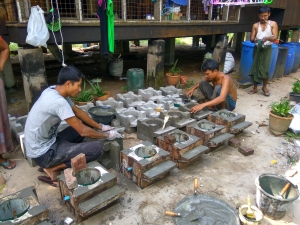Simple cook stoves ignite entrepreneurial spirit in Myanmar
Location: Pyin Bugyi, Myanmar. 26th Sep 2017
Mangroves provide critical ecosystem services and shield inland areas from storms and tidal surges. They also provide food and other resources that coastal communities rely on day to day. Like many who live along the coast in Tanintharyi, Nyan Lin Aung uses fuel-wood collected from mangroves to cook food for his family. Nyan supports his family by farming rice on a small piece of land but he always dreamed of new opportunities to develop his own business to bring in additional income for his family.
Fuel-wood collection and charcoal production, along with the expansion of agriculture and aquaculture, are the main reasons mangroves are being lost in Myanmar. With very limited access to other energy sources, such as electricity or gas, many coastal communities rely on wood to fuel their cooking fires and for construction materials. Recent studies indicate that each rural household in Myanmar consumes more than 2.5 tonnes of fuel-wood every year. This, coupled with an ever growing human population and increasing demand for land, is leading to the destruction and degradation of mangrove forest ecosystems.
One way to address this problem is to use cook stoves that use less fuel-wood. In August 2016, Mangroves for the Future (MFF) teamed up with Mangrove Service Network (MSN) and Nyan’s community to start a small project to introduce energy efficient stoves. Rather than just hand over factory-made stoves, the project trained community members in making the stoves. By using the stoves, families were able to save time as they no longer had to collect wood, and money as they no longer had to buy charcoal.

MFF project beneficiaries learn to make energy-efficient stoves
Nyan saw a business opportunity. With increasing interest from other communities nearby to use the stoves, Nyan gathered his savings, purchased materials and equipment, and set out to make more stoves that he could sell.
Since he started his own small business, Nyan has been able to earn an additional US $400 to support his family. By encouraging others to use the stoves, Nyan has reduced the demand for fuel-wood and charcoal, and therefore contributed to conserving Tanintharyi’s mangroves.

An energy-efficient cookstove
“Now I want to take the next step and build my business by selling my stoves to villages along the highway,” says Nyan with enthusiasm and ambition. Nyan is hoping the demand for these stoves will extend to nearby towns, providing new opportunities for his business to expand.
Nyan’s story is a good example of how small investments in community action can pave the way for conserving important coastal habitats, while also catalysing positive social change.
This story was contributed by Zin Myo Thu, MFF National Coordinator for Myanmar. Zin drafted the piece following the IUCN Asia Strategic Communications for Conservation Workshop in Bangkok, Thailand, which took place in July.

Nyan Lin Aung (left) making fuel-efficient stoves, Pyin Bugyi, Myanmar © MFF Myanmar